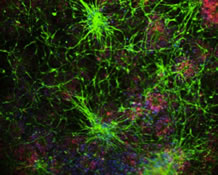Columbia University
Irving Medical Center
Neurological Institute
710 West 168th Street, 3rd floor
(212) 305-1818
About Us
Taub Faculty
My laboratory is focused on understanding glial pathology in central nervous system (CNS) diseases. Astrocytes are amongst the most abundant cells in the CNS and play vital roles in maintaining homeostasis in the brain microenvironment. The ultimate mission of the laboratory is to understand the heterogeneity of astrocytes in different regions of the CNS, define how astrocytes respond to various types of injury, and discover novel astrocyte-centered approaches to treat neurodegenerative diseases (NDs) and brain tumors. We use single cell RNA sequencing and spatial transcriptomics to define the transcriptional programs which inform the development and testing of therapeutic targets.
One of the main areas of research in the laboratory is neurodegeneration. Diseases such as Huntington’s disease (HD), Parkinson’s disease (PD), Frontotemporal dementia (FTD), and Alzheimer’s disease (AD), result in neuronal loss and astrocytes dysfunction. Ultimately, we aim to define how astrocytes become dysfunctional in different diseases and leverage this knowledge to modify the course of disease progression in models of neurodegeneration in vivo and in vitro, which is a key step to translating this knowledge into clinical tools.
A central focus of research in the laboratory is glioma biology. Glioblastoma is a brain malignancy that defies current treatment modalities. Glioma cells diffusely infiltrate the brain and elude surgical resection. At the resection margins of glioma, the tumor cells interact with non-neoplastic cells of the brain microenvironment, including astrocytes, which may contribute to disease progression. Using single nucleus RNA sequencing, we identified different states of astrocyte gene expression, some may promote tumor progression. Ongoing projects leverage this knowledge to block tumor progression and test therapeutic targets.


